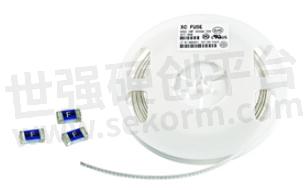The Application of Self Recovery Fuse in Rechargeable Battery Pack

1. The application of self recovery fuse in rechargeable battery pack
1) Problem and Analysis: NICD, NiMH, and Li-ION are commonly used in special protection circuits for mobile phones and computers. The reasons for these battery pack failures are usually: an unexpected short circuit between the positive and negative terminals; The charger cannot stop charging a fully charged battery; The polarity of the wrong charger or the battery is reversed. Installing the PTC patch series in series in various units of the battery pack can provide overcurrent and over-temperature protection for the circuit.
2) Protection requirements: In the event of a malfunction, the voltage of the mobile phone can reach 16V, and the voltage of the computer can reach 24V; Its current can reach 100 amperes. In overcharging conditions, the battery pack needs to be protected against overheating. NiCD batteries cannot eXCeed 120C, and NiMH and Li-Ion batteries cannot exceed 90C.
The ultra-small package (0402 specifications) is very suitable for secondary protection of circuits and is suitable for applications with limited space, such as handheld portable electronic devices.

Fig.1
- +1 Like
- Add to Favorites
Recommend
- The Difference between Self Recovery Fuse and Blown Fuse
- What is A Self Recovery Fuse
- Selection Guide of Self Recovery Fuse
- Applications of Self Recovery Fuse Parameters
- How Long Does the self Recovery Fuse Operate?
- Self Recovery Fuse Specification, Must Understand
- Self Recovery Fuse for Overheat Protection in Circuits
- How to Select the Type of Self Recovery Fuse for Procurement?
This document is provided by Sekorm Platform for VIP exclusive service. The copyright is owned by Sekorm. Without authorization, any medias, websites or individual are not allowed to reprint. When authorizing the reprint, the link of www.sekorm.com must be indicated.





























































































































































































































































































































































































































































































































































































































































































































































































































































































